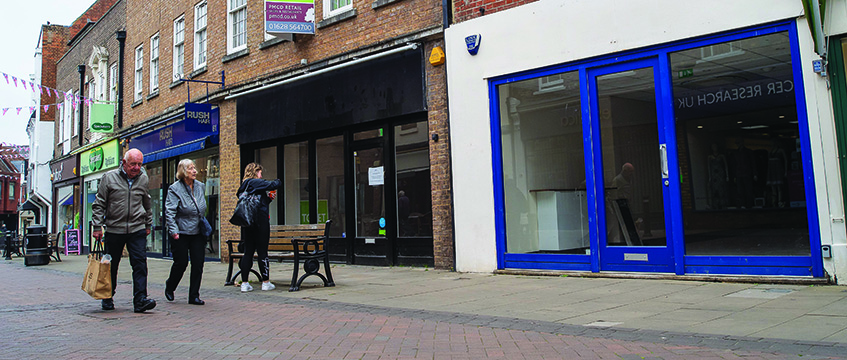In March, the government published a summary of responses to its consultation on business rates avoidance and evasion, launched in July 2023.
One key outcome was the introduction of a stricter regime for property owners claiming empty property relief for when there are voids in their properties.
The government announced an extension to the empty property relief “reset period” from six weeks to 13 weeks from 1 April 2024. A property must now be occupied for a minimum of 13 weeks before it can receive either the three months (offices/retail) or six months (industrial) EPR. Properties that have already benefited from EPR are also required to be occupied for a minimum of 13 weeks before they can benefit from a further period of relief.
The government believes this new legislation will disincentivise tax avoidance and, in particular, “the widespread practice of ‘box shifting’” – a method of artificial occupation which involves landlords moving items into a building solely to satisfy the six-week occupation condition.
Items are then removed once the reset period is completed, rendering the building unoccupied and eligible for another period of EPR. The government noted that 58% of respondents to its consultation said extending the reset period would be the most effective means of reducing losses from rates avoidance and highlighted the precedent set by similar “reforms” in Scotland and Wales.
So, what do we think?
At Colliers, we are dismayed at this new legislation, which is a kick in the teeth for landlords that are already struggling to let their properties. It seems based on the premise that landlords need to be encouraged, or even coerced, into letting vacant properties, claiming EPR as some kind of scam, rather than a necessity.
This is a total misreading of what is going on in the market, where lack of demand and long-term socio-economic factors are the main reasons behind empty commercial property, not landlords wanting to keep their property empty.
It’s a particular blow for high street landlords, as well as retailers, most of which have 5% of their estate empty at any one time because of relocations or approaching lease events.
Given that it can take up to 12 months to find an appropriate tenant for a property, why are landlords penalised for trying to mitigate business rates bills at a time when they are receiving no rent on their properties?
Will the scheme lead to a reduction in voids?
Evidence seems to suggest that voids will not be reduced. Extending the reset period for EPR has been trialled in Scotland and Wales and has not resulted in more properties being let. Instead, it has simply resulted in landlords, unable to find a tenant for their vacant properties, paying more in business rates, putting further pressure on the sector.
Statistics from the Local Data Company bear this out. The extension of the reset period for EPR was introduced in Scotland in 2020 and in Wales in 2022. Since then, vacancy rates in Scotland reached 15.9% in Q2 2023 (an 18-month high), according to the Scottish Retail Consortium. And in Wales during the same period, retail vacancies reached 16.7% (the highest in the UK), according to the Welsh Retail Consortium.
Looking at individual cities, according to the LDC, Scottish town centre vacancy rates in Aberdeen, Edinburgh and Glasgow were 15.1%, 8.0% and 13.7% respectively in 2019. By mid-2023 they were 21.6%, 16.6% and 17.6%.
Wales shows a similar pattern. Vacancy rates in Cardiff, Swansea and Aberystwyth were 15.8%, 17.5% and 10.1% respectively in 2019. By mid-2023 they were 24.9%, 21.3% and 30.6%. Far from reducing vacancy rates, the new policy has coincided with a period in which voids have increased. So much for saving the high street.
Abuses
While the legislation will deter “box shifting”, there are other, more prevalent, questionable schemes out there that might even be encouraged by this change.
We are a strong supporter of the charity sector and advise the Charity Tax Group on its business rates strategy. Charities quite rightly get significant help with business rates, and that is commendable and essential.
However, these changes in EPR open the way for less scrupulous advisers to take advantage of some charities’ status. Some advisers contact landlords offering them a way out of these longer business rates liabilities by letting or licensing the property to a “charity” and take hefty fees for the introduction.
The charity does not even have to occupy the property, just hold it on licence, and will receive a donation for its trouble. The landlord has its business rates liability reduced as no rates are payable but the high street becomes even further a haven for empty properties.
Surely that is not what the government had in mind?
Missing the point
These new rules yet again illustrate the government’s total failure to understand the business rates issue – that, fundamentally, business rates are just too high and are approaching a 60% tax. Nowhere else in Europe are property taxes so high.
The reason landlords try to mitigate their tax liability is simply that the level is increasingly unaffordable. Charging empty rates at 100% to a landlord or tenant of retail premises in 2024 is akin to levying 50% income tax on a person made redundant in a recession.
We believe that if the multiplier was rebased to a fairer, say, 34p business rates tax, much of this need to mitigate or avoid business rates would disappear. Far from cracking down on EPR, the chancellor should have instead extended the three- and six-month empty rates holidays to 12 months for all property types, including the offices and retail sectors.
It is disappointing that the government failed to support business, instead making things more difficult and disincentivising investment along the way.
Read the responses to the consultation here.
John Webber is head of business rates at Colliers










